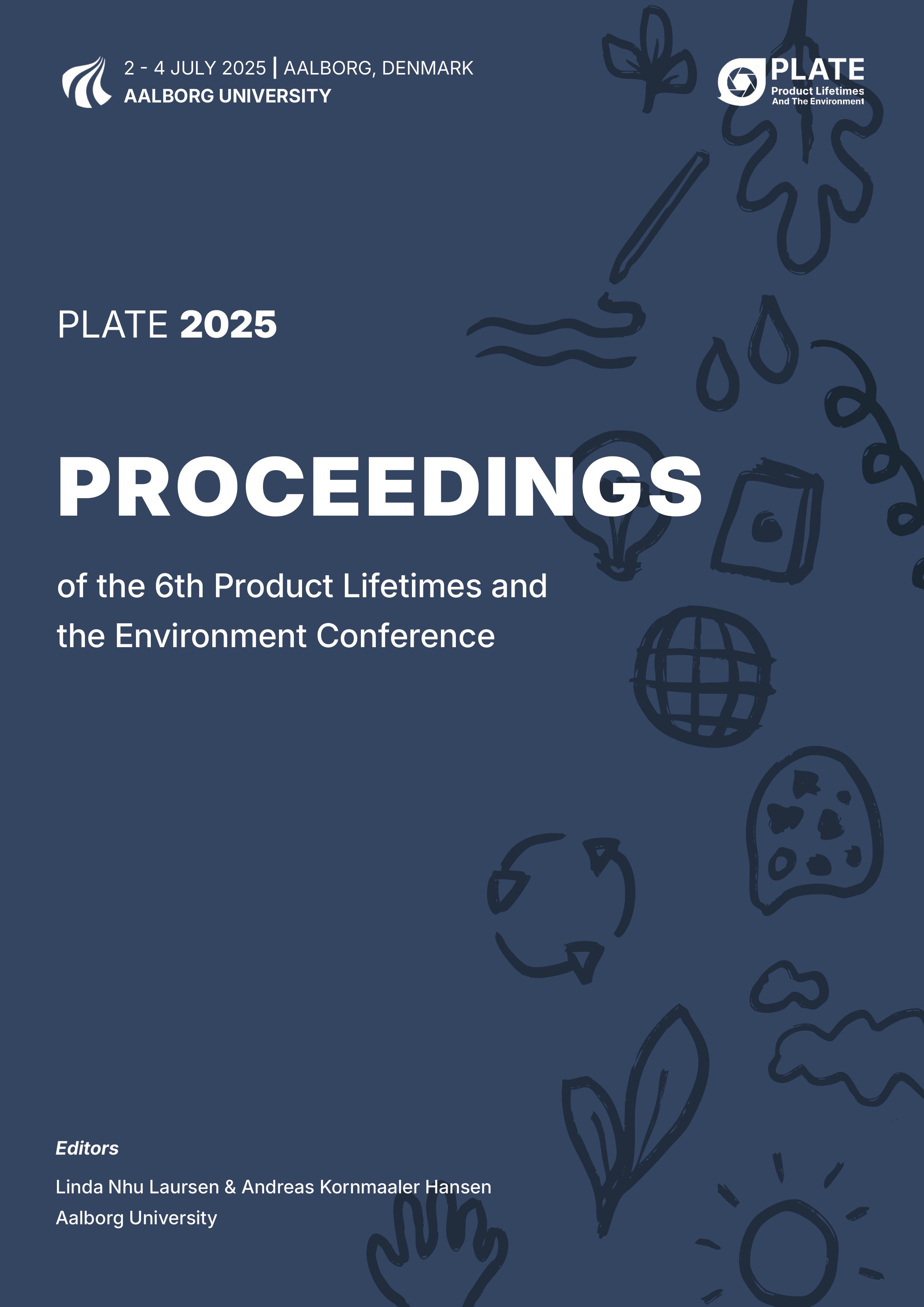Re-purposing Wind Turbine Blades
Matching strategies and Innovation Governance Forms
DOI:
https://doi.org/10.54337/plate2025-10269Keywords:
Innovation governance, Re-purposing strategies, Waste management, Wind turbine blade materialsAbstract
The decommissioning of wind turbine blades poses an escalating environmental and waste management challenge, as the composite materials found in these blades are difficult to recycle and often end up in landfills. With the projected growth in retired wind turbine blades, the waste burden is expected to reach 40–60 million tons by 2050. Traditional disposal methods, like mechanical and thermochemical recycling, are costly and result in low-value materials. Repurposing presents a sustainable alternative; however, matching decommissioned blades with appropriate industrial applications requires an innovative governance approach. This study leverages insights from innovation governance research and proposes a conceptual model for reusing decommissioned blades, focusing on bridging the gap between potential suppliers and users in various industries. By examining applications in construction, agriculture, and renewable energy systems, the study illustrates feasible repurposing strategies and explores the regulatory mechanisms needed to facilitate effective matching. Through expert interviews and case studies, the paper identifies barriers, such as logistical constraints and material degradation, and advocates for intermediate and third-party governance forms to support this marketization process. The findings highlight the importance of systematic matching mechanisms and regulatory frameworks in addressing the wind turbine blade disposal issue, underscoring the need for collaborative efforts in shaping sustainable solutions for end-of-life turbine materials.
References
Ahrens, A., Bonde, A., Sun, H. et al. (2023) Catalytic disconnection of C–O bonds in epoxy resins and composites. Nature 617, 730–737. https://doi.org/10.1038/s41586-023-05944-6
Alderson, W. (1957): Market behaviour and executive action, Richard D. Irwin
Angelis-Dimakis, A., Arampatzis, G., Pieri, T., Solomou, K., Dedousis, P., & Apostolopoulos, G. (2021). SWAN platform: A web-based tool to support the development of industrial solid waste reuse business models. Waste Management & Research, 39(3), 489-498. https://doi.org/10.1177/0734242X21989413.
Chesbrough, H. (2024). Twenty years of open innovation. MIT Sloan Management Review, 65(2), 1-3.
Chioatto, E., & Sospiro, P. (2023). Transition from waste management to circular economy: the European Union roadmap. Environment, Development and Sustainability, 25(1), 249-276. https://doi.org/10.1007/s10668-021-02050-3.
Cooperman, A., Eberle, A., & Lantz, E. (2021). WTB material in the United States: Quantities, costs, and end-of-life options. Resources, Conservation and Recycling, 168, 105439. https://doi.org/10.1016/j.resconrec.2021.105439
Drake, D. F., & Spinler, S. (2013). OM forum—Sustainable operations management: An enduring stream or a passing fancy? Manufacturing & Service Operations Management, 15(4), 689-700. https://doi.org/10.1287/msom.2013.0456
Duong, K., & Saphores, J. D. M. (2015). Obstacles to wastewater reuse: an overview. Wiley Interdisciplinary Reviews: Water, 2(3), 199-214. https://doi.org/10.1002/wat2.1074.
Fan, W., & Zhang, C. (2024). Does Green Finance Affect Economic Performance? Growth and Crowding-Out Consequences. Emerging Markets Finance and Trade, 1-21. 10.1080/1540496X.2024.2345186
Feast, L., & Laursen, L. (2023). Design from Waste Materials: Situation, Problem, and Solution. Learn X Design Conference Series. https://dl.designresearchsociety.org/learnxdesign/learnxdesign2023/fullpaper/16
Gharde, S., Kandasubramanian, B. (2019) Mechanothermal and chemical recycling methodologies for the Fibre Reinforced Plastic (FRP), Environmental Technology & Innovation, 14, 100311. https://doi.org/10.1016/j.eti.2019.01.005.
Ge, Z., Wu, Y., Zeng, M., Zhang, H. (2024) A Critical Review on the Structure and Recovery Technologies of End-of-Life Wind Turbine Blades. Energy & Fuels, 38 (20), 19393-19413. DOI: 10.1021/acs.energyfuels.4c03648
Global Wind Report 2021, available online: https://gwec.net/wp-content/uploads/2021/03/GWEC-Global-Wind-Report-2021.pdf (accessed on Nov 8, 2024)).
Laursen, L. N., & Andersen, P. H. (2023). Resource and supplier interaction in network innovation governance: the case of innovating at Unilever. Journal of Business Research, 156, 113465. https://doi.org/10.1016/j.jbusres.2022.113465
Gopalraj, S.K., Kärki, T. (2020) A review on the recycling of waste carbon fibre/glass fibre-reinforced composites: fibre recovery, properties and life-cycle analysis. SN Appl. Sci. 2, 433. https://doi.org/10.1007/s42452-020-2195-4
Leon, M. J. (2023). Recycling of wind turbine blades: Recent developments. Current Opinion in Green and Sustainable Chemistry, 39, Article 100746. https://doi.org/10.1016/j.cogsc.2022.100746
Liu, P., Meng, F., Barlow, C.Y. (2019) Wind turbine blade end-of-life options: An eco-audit comparison, Journal of Cleaner Production 212, 1268-1281, https://doi.org/10.1016/j.jclepro.2018.12.043.
Nelson, R. R. (1991). Why do firms differ, and how does it matter? Strategic Management Journal, 12(S2), 61-74. https://doi.org/10.1002/smj.4250121006
Metcalfe, S., Broström, A., & McKelvey, M. (2024). On knowledge and economic transformation: Joseph Schumpeter and Alfred Marshall on the theory of restless capitalism. Industry and Innovation, 1-14. https://doi.org/10.1080/13662716.2024.2376318
Sokoli, H.U., Beauson, J., Simonsen, M.E., Fraisse, A., Brøndsted, P., Søgaard, E.G. Søgaard (2017) Optimized process for recovery of glass- and carbon fibers with retained mechanical properties by means of near- and supercritical fluids, The Journal of Supercritical Fluids 124, 80-89, https://doi.org/10.1016/j.supflu.2017.01.013.
Spini, F., & Bettini, P. (2024). End-of-Life wind turbine blades: Review on recycling strategies. Composites Part B: Engineering, 111290. https://doi.org/10.1016/j.compositesb.2024.111290
Waste Framework Directive.” Accessed: Nov. 7, 2024. [Online]. Available: https://environment.ec.europa.eu/topics/waste-and-recycling/waste-framework-directive_en.




